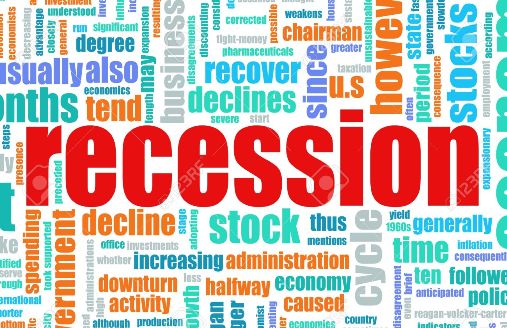Majority of the population have not witnessed recession before now, only on the pages of textbooks or news tabloid do they experience the concept, but now even a man who is not lettered knows what recession is.
From the lettered point of view, a period of recession is that which is characterized by negative economic growth for two consecutive quarters. In a period of recession, economic activities declines, there is decrease in government spending, high rate of unemployment, increased cost of production, fall in output, drastic reduction in real income, inflation rate hits a record time high, most times an unprecedented two figure.
Generally, it is a period of massive contraction of the economy which if not taken seriously could lead to a depression. But beyond all these abstractions, recession is felt on the streets, It is recession when government revenue decreases with the situation presenting her with no choice than to borrow heavily to finance the budget, it is recession if the private sector begins to lay off or retrench workers in large numbers, it is recession when some organizations begin to close down or stop a whole line of production due to scarce foreign exchange, it is recession when the local currency witness a free fall in relation to other international currency, it is recession if about 27 states of a federation are unable to pay salaries and depends on federal bailout, it is recession when upcoming businesses or small scale businesses are unable to get loans thereby squeezed out of the system. It is recession when there is high increase in the prices of goods and services, it is recession when the unemployment rate hits a record time high alongside inflation rate, it is recession when there are no enough savings to cushion this adverse effect. Hence the best way to give realistic definition of these is to look at the prices of goods in relation to reduction in real income.
A bag of rice at present is almost three times its usual price; cost of everything is shooting high to the sky.
Yet, there was no how we could have escaped this contraction, it would eventually catch up on us, as a matter of fact, some economists are of the opinion that it was long due, basically because of our corruption and profligate spending. We never saved for the raining day, not only did we not envisaged the event in the international commodity market but the foreign reserve was depleted.
This situation was worsened by an all time decrease of crude oil from $100 to about $25, disruption of oil explorative activities in the Niger delta caused by incessant pipeline vandalization and over- reliance on oil revenue. It was initially difficult for the government to agree that the country was in a recession, but there was nothing to hide, the indices are there on the street, not long, Nigeria was overtaken by South Africa as the biggest economy on the continent.
However if there is a recession, there is a recovery, and this calls for rethink, many had called on the government to diversify the economy and create conducive environment for the attraction foreign direct investment, some had even advocated for more government spending in order to stimulate the economy.
I have no doubt that these factors could resuscitate our dwindling fortunes, but put succinctly and in a simpler way, the state must be deliberate in its attempts to stare the economic ship out of recession, one of the major causes of recession is over blotted public sector, a situation where the government is the largest investor in the economy, this has to stop, government must create an enabling environment for private sector participation in the economy.
The state must look for ways of reducing the cost of governance and cut down on frivolities. Stimulus packages must be directed at the agricultural sector to encourage food production if we must attain that stage of food sufficiency, with this we can hope to decrease the bill on food importation. The state should increase its spending and work out a public private partnership that would create employment opportunities.
Some sectors of the economy should be closely monitored to achieve short term diversification, sectors like, agriculture, light manufacturing, and agricultural processing. We need to begin to look inward and patronize made in Nigeria products, government must put an end to the importation of some product such as tooth picks, matches, some kind of fabrique.
The state must effectively practice trade liberalization alongside protectionism if it must drive the economy out of recession.
What we should begin to avoid now is a depression and look forward to a recovery, the CBN governor has recently hinted that the worst is behind us, and analysts are projecting a significant growth for 2017, but the fact still remains that this present administration mrust avoid the mistakes of the past, it must be deliberate in its attempt at economic recovery, seek advice from pundits and stakeholders and in the process of resuscitating the economy, it must avoid mortgaging the future through excessive borrowing.
